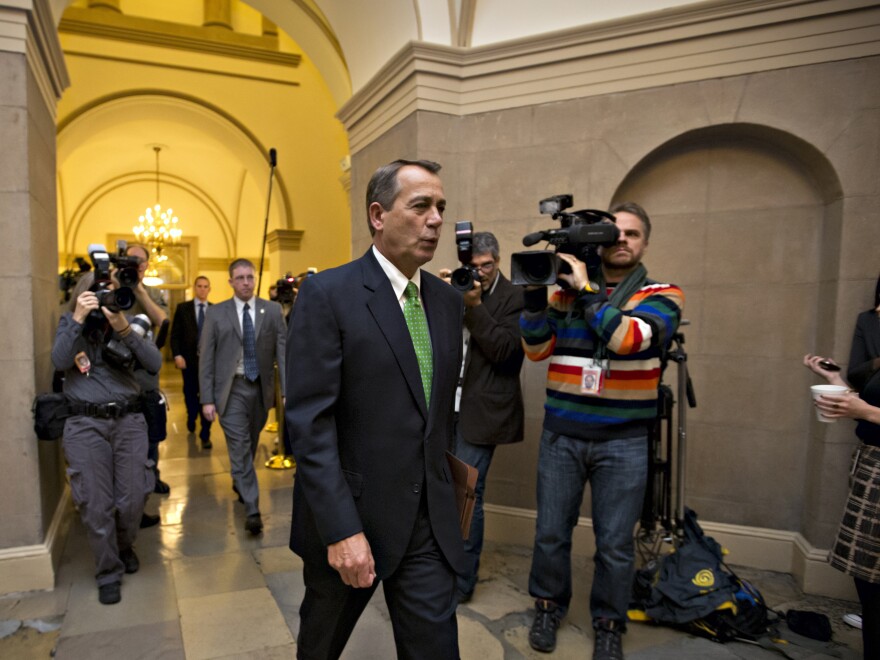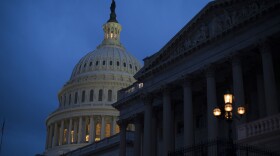The House of Representatives voted 257-167 late Tuesday to pass a Senate-approved compromise deal that stops large tax increases for 99 percent of Americans, and delays massive spending cuts for two months.
The bill now goes to President Obama, who is expected to sign it into law.
NPR's S.V. Date is reporting on the deal for our Newscast unit. Here's what he says:
"The eventual deal was hammered out by Senate Republican Leader Mitch McConnell and Vice President Joe Biden. It passed the Senate with overwhelming, bipartisan support.
"But passage in the House came only after Speaker John Boehner abandoned a longstanding Republican requirement that a bill could only come to the floor if a majority of Republicans supported it."
Update at 11:40 p.m. ET Obama Welcomes Deal
President Obama thanked lawmakers from both parties for their votes, saying it allows him to "sign a law that raises taxes on the wealthiest 2 percent of Americans while preventing tax hikes that could have sent the economy back into recession."
Speaking at the White House, he also urged lawmakers to not wait until the last minute on the other looming budget deadlines.
"The one thing that, I think, hopefully in the new year we'll focus on is seeing if we can put a package like this together with a little bit less drama, a little less brinkmanship, not scare the heck out of folks quite as much," he said.
Our original post:

The House of Representatives is in a rare New Year's Day session, as its members consider a budget compromise the Senate approved in the early-morning hours of 2013. Many House Republicans are unhappy with the deal — including Rep. Eric Cantor, the chamber's Republican leader.
Update at 8:50 p.m. ET: House Moves To Put Senate Bill To A Vote
Facing the prospect of being seen as the chief obstacle in blocking legislation to avoid the "fiscal cliff," House Republicans moved to bring the measure to the House floor for a vote.
The bill was approved by the Senate in the early hours of Tuesday and sent to the House.
The decision came after a long day of closed-door meetings in which House Republican leaders explored the possibility of amending the bill and sending it back to the Senate with changes regarding spending cuts.
But the Senate adjourned for the day, and the bill might have gone unanswered until Wednesday, and have had an adverse effect on financial markets.
In addition, a Senate Democratic leadership aide said Majority Leader Harry Reid would "not take up the bill" if the House changed it and returned it to the Senate, reports The Associated Press.
It is unclear if the expected up-or-down House vote would pass.
Update at 6:09 p.m. ET: The Senate Has Adjourned Until Noon ET, Wednesday.
Update at 3:54 p.m. ET: House Vote Is Still Possible Tuesday.
Reporters from CNN and Reuters quote Cantor as saying "I do not support the bill," as he passed journalists gathered near a GOP meeting Tuesday afternoon — but he added that no final decisions have been made on the best way to handle the bill.
Moments later, Rep. Steve LaTourette, R-Ohio, told CNN's Dana Bash that he and his colleagues won't be hemmed in by the votes of "sleep-deprived octogenarians" in the Senate. He added that the House might hold a vote on the compromise bill after a meeting at 5 p.m. ET — fueling ideas that the House leadership might hold a vote on an amended version of the bill.
Those developments closely followed an impromptu news conference held by House Minority Leader Nancy Pelosi, who called for action on the bill.
"It shouldn't even be a question," Pelosi said, noting that the House has been waiting for the Senate to send it a bill. She said that she is now looking for "a straight up-or-down vote" on the compromise.
The Senate vote was 89-8 in favor of the deal, which would delay by two months across-the-board cuts totaling $24 billion that are scheduled to kick in under the "fiscal cliff" collection of budget cuts and tax hikes.
As NPR's David Welna reports from Capitol Hill, Republican Mo Brooks of Alabama complains that the compromise bill is being rushed through the House.
"Mr. Speaker, if we vote on the Senate fiscal cliff bill today, I will vote against it because this is not the way to do the peoples' business."
The compromise deal's focus on taxes, and postponement of spending cut decisions seems to be the main sticking point for House Republicans. Moments ago, the offices of Cantor and House Speaker John Boehner released seemingly identical statements noting that "The lack of spending cuts in the Senate bill was a universal concern amongst members in today's meeting."
The revenue gap created by the postponed mandatory cuts would be filled temporarily by tax increases and cuts in other programs. The stop-gap is meant to give Congress and the president more time to work out a broader deal.
The Senate spent the first few hours of the New Year ironing out the final details of a plan to roll back a package of automatic spending cuts and tax increases that technically went into effect at midnight.
President Obama, speaking shortly after the Senate vote, said that "while neither Democrats nor Republicans got everything they wanted, this agreement is the right thing to do for our country." He urged the House, which is set to meet at noon, to "pass it without delay."
The Senate vote took place after midnight, meaning that the U.S. technically went over the much-dreaded "fiscal cliff." But the impact is expected to be minimal — assuming the House votes to pass the bill in the next few days.
The House must act before midnight Thursday, when it hands off the baton to the incoming 113th Congress. If it cannot act before then, the fiscal crisis would be handed to the new Congress to consider.
The deal would leave both sides with less than they want: Republicans wanted taxes to remain steady for all Americans, Democrats wanted Bush-era tax cuts to expire for those making more than $250,000 a year. The two sides compromised at raising rates on taxpayers earning in excess of $400,000 (or $450,000 for couples).
One of the most vocal opponents in the Senate was Iowa Democrat Tom Harkin, who said the compromise was a boon to the wealthiest Americans at the expense of those with lower incomes.
"Maybe now we are all believers of trickle-down economics. Not I," Harkin said on the floor.
As NPR's John Ydstie reports, "Ninety-nine percent of Americans will see little or no change in income tax rates because of this deal. But the top 1 percent will see an increase of almost 5 percentage points on incomes above $400,000 for individuals and $450,000 for couples."
It would be the first major tax increase in two decades.
Ydstie says the agreement extends unemployment benefits for two million Americans but it doesn't extend the payroll tax holiday.
"That means virtually all U.S. workers will see their Social Security payroll tax rise 2 percentage points, back to the normal 6.2 percent on income up to $113,000," he says.
For the typical household with $50,000 in earnings, that amounts to about $20 per week. It could cost high-income households as much as $85 a week.
It's now the House's turn to seal the deal. The Senate overwhelmingly supported the compromise, and House Speaker John Boehner of Ohio and the chamber's Republican lawmakers are under enormous pressure to follow suit.
As The Associated Press points out:
House Speaker John Boehner pointedly refrained from endorsing the agreement, though he's promised a vote on it or a GOP alternative right away. But he was expected to encounter opposition from House conservatives.
"It's three strikes in my book and I'll be voting no on this bill," Rep. Tim Huelskamp told CNN Tuesday morning. Huelskamp says the legislation would impose a hardship on small businesses around the country and falls short of addressing the need for cuts in spending.
Speaking before the Senate's vote in the small hours of Jan. 1, Vice President Joe Biden — who worked with Senate GOP Leader Mitch McConnell of Kentucky to hammer out the measure — said his long experience on the Hill had taught him not to try to predict an outcome from either chamber.
"You shouldn't predict how the House is going to vote. But I feel very, very good," Biden told reporters.
Copyright 2020 NPR. To see more, visit https://www.npr.org. 9(MDAxNDQ2NDAxMDEyNzU2NzM2ODA3ZGI1ZA001))




